Featured
Patriots Blast Amaechi For Sabotage
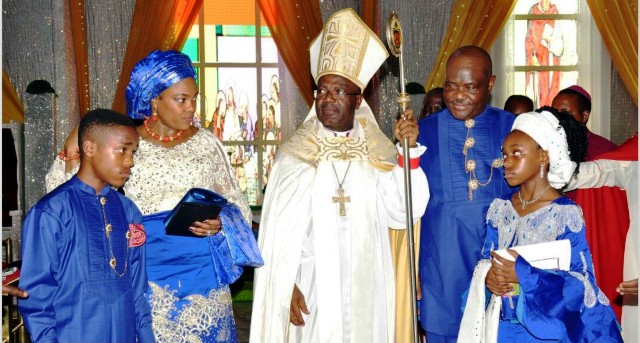
Stakeholders have continued to react to the disgraceful behaviour of the Transportation Minister, Chibuike Rotimi Amaechi, during the visit of Acting President, Prof Yemi Osinbajo to Rivers State, last Thursday.
Osinbajo was in the state on a one-day working visit to commission the world-class Indorama fertilizer plant in Eleme, the Chokocho-Umuechem-Ozuzu road and the Chokocho-Igbo-Etche-Rumuokurushi inter-change in Etche.
But the minister, who touched down first from the same presidential jet with the acting president, immediately walked into a waiting chopper, while the august visitor acknowledged cheers from the cream of Rivers stakeholders, walked to join the chiefs, political and opinion leaders, women and youth in a tumultuous reception at the Port Harcourt International Airport, Omagwa.
One of such stakeholders is the Publicity Secretary of the Coalition of Rivers Patriots, Barrister Thompson Barilede, who expressed the group’s shock and concerns over Amaechi’s continued plots to undermine the state and its people.
Speaking with newsmen in Port Harcourt, Barilede said that it was against protocol and glaring insult for Amaechi to leave the jet that brought them from Abuja, to a waiting chopper without exchanging pleasantries with Rivers chiefs and other dignitaries at the airport to receive the acting president and his entourage.
Barilede also condemned the former governor’s failure to accompany the acting president to the commissioning of roads constructed by the state government, describing the action as a deviation from the traditional hospitality which the average Rivers man is known for.
He, however, praised the Rivers State Governor, Chief Nyesom Wike for giving the acting president all the necessary support and guidance during the visit, describing the governor as a focused leader.
The spokesman while lauding the governor for providing leadership and demonstrating maturity, as well as the traditional Rivers hospitality to the visiting acting president, thanked the nation’s Second Citizen for endorsing the good governance template in Rivers State under Wike.
He said that recommending the achievements of Wike to other political leaders, especially serving governors, was a clear demonstration that Osinbajo recognises the giant feats recorded in Rivers State, and charged other political leaders in the state to de-emphasise partisan concerns and work in the interest of Rivers people.
Similarly, two top chieftains of the Peoples Democratic Party (PDP), Prince Uche Secondus and Hon. Austin Opara, have frowned at the turn of events during the visit of the Acting President, Prof Yemi Osinbajo to Rivers State.
Speaking to aviation correspondents at the Port Harcourt International Airport, Omagwa, shortly after the visit of the Acting President, the former Acting National Chairman of PDP, Uche Secondus, said that the Acting President allowed himself to be influenced by party politics rather than real governance during his visit.
“We were surprised that the acting president came and decided to go for the commissioning of Indorama first, before going to commission the projects for which he was invited to Rivers State.
“Rivers State governor wrote and requested for the Acting President’s visit, and an approval was given in writing from the Presidency, confirming the visit, and commissioning of Indorama was not part of the request from the state government.
“The projects that he was invited for were supposed to be commissioned first before any other project, but what we saw during the visit was Amaechi and APCs influencing the decisions for the day by bringing in the Indorama issue.
“Amaechi is not the governor, he is a minister. The acting president should not allow himself to be dragged down by Amaechi and APC. This is not an election year. The country is facing a lot of challenges, and let them focus on addressing these challenges, and not play party politics instead of governance,” he said.
Secondus, therefore, urged the acting president to live above board, and focus on issues that are paramount to the nation, adding that the world was watching his performance as an intellectual.
Also speaking, the former Deputy Speaker of House of Representatives, Hon Austin Opara, expressed surprise at the turn of events during the visit of Osinbajo.
“It is unfortunate that things turned out that way. The acting president is the guest to the state and was duly invited to commission specific projects built by Governor Nyesom Wike.
“He accepted the visit and the projects he was invited for, but power play and party politics took over the process.
“The interest of Amaechi and APC is that the projects should not be commissioned, but the projects are visible for everyone to see, and you cannot suppress them.
“What I expected Amaechi and APC to do was to congratulate Governor Nyesom Wike, and probably ambush him in the next election to take over power,” Opara added.
Corlins Walter & Susan Serekara-Nwikhana
Featured
We’ll Comply With Supreme Court Judgement, Fubara Assures …As CJ Inaugurates Judges’ Quarters
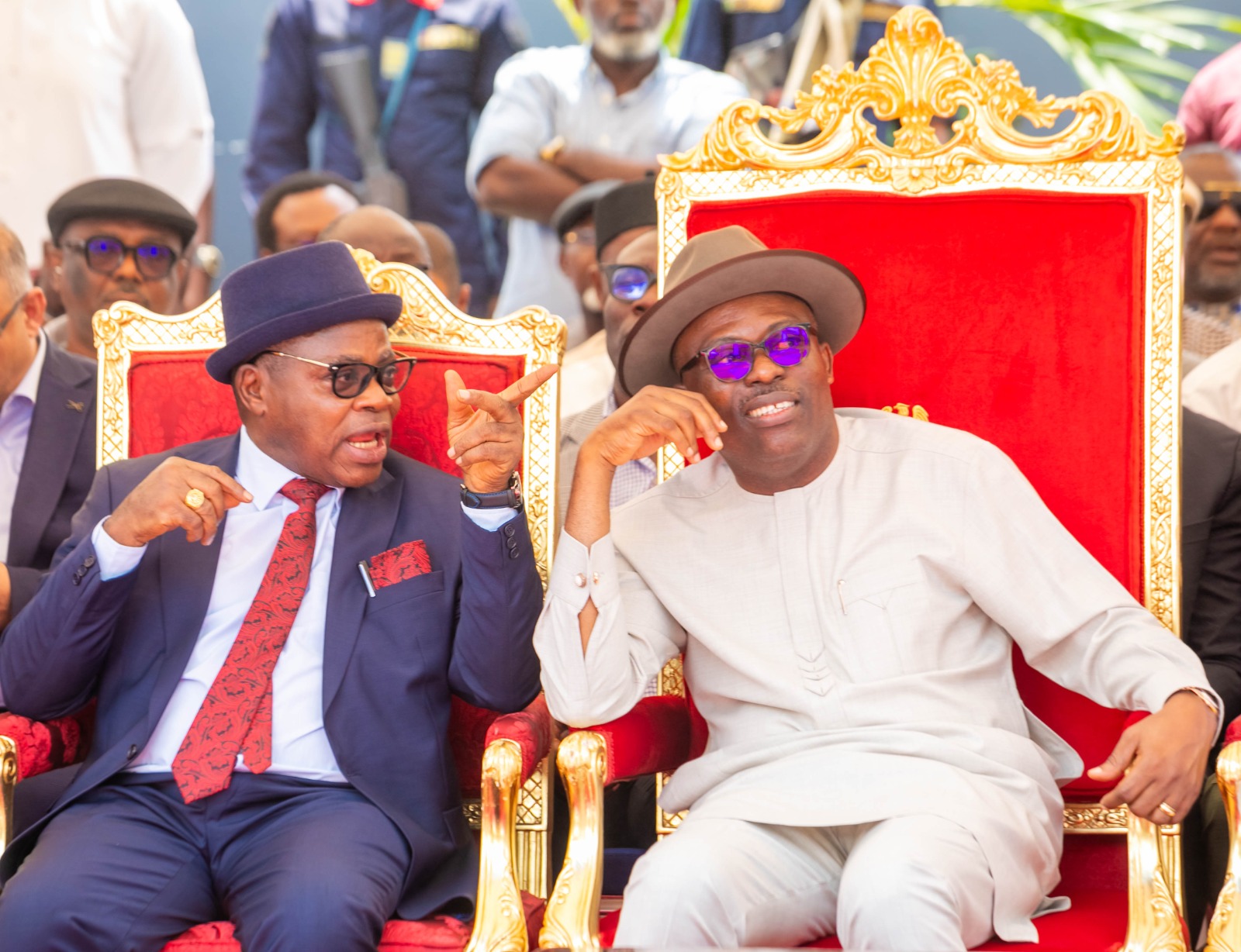
Rivers State Governor, Sir Siminalayi Fubara, has assured that his administration will implement, to its fullest, the recent judgment of the Supreme Court of Nigeria on the political crisis in the State.
The Governor maintained that what is important, in all of the happenings that had been witnessed, has been the protection of the interest of Rivers State because it must be above whatever personal interest that anybody could hold and canvass.
Governor Fubara gave the assurance during the inauguration of the new Judges’ Quarters, a housing facility completed by his administration for Judges indigenous to Rivers State by birth or marriage, at Old GRA, in Port Harcourt City Local Government Area, yesterday.
The Governor explained: “It has not been an easy 16 months, but what is important is the interest of our State, which must be above our personal interest. I want to say it here, very loud and clear to everyone, the Supreme Court has given a judgment, my administration is going to implement the judgment to its fullest. The reason is clear: It is not about me, it is about the good of this State.”
Governor Fubara alluded to the quantum of loss, in terms of money expended, in prosecuting the political crisis, on both sides, which has gone to waste, regrettably.
Such financial resources and other efforts, he said, would be more profitable, if they were synergised, and channeled to courses that promoted the genuine well-being and good of the State, adding that something more assuring would have been showcased.
Governor Fubara stated: “Thank God where we are today, I can assure you publicly that, any day, any time, I have not gone back on that my statement: that nothing (no price) is too big to pay for peace in this State, because at the end of the day, it is about our people. It is not about me, I will leave office but the good work that I have done will speak for me and will defend my generation.”
Commenting on the project, Governor Fubara emphasised that it further shows that his administration takes the issue of welfare, particularly of judicial officers, seriously, explaining that his administration inherited the project and with reports from the Ministry of Justice and some concerns from the Judiciary, it became imperative to continue with it.
He said, “We give glory to God that today, we have completed this project, and we are willing and ready to hand it over to the lucky judges who are going to live here so that they can perform their duties effectively.”
Governor Fubara pointed to the need for proper maintenance of the housing facility and the entire premises so that it can offer required satisfaction, maximally, and assured the Executive’s readiness to provide support in that regard.
Performing the inauguration, Chief Judge of Rivers State, Justice Simeon Amadi, recalled how he laid the foundation stone of the project, which was initiated by the immediate past administration on May 22, 2023, and thanked Governor Fubara for continuing and completing the project, which now represents another milestone and great accomplishment for the Rivers State Judiciary.
He added, “We are pleased with this landmark achievement, which represents the continuation of the policy of providing befitting residential accommodation for judges of Rivers State on owner-occupier basis or monetary ground in lieu there-off. This is backed by the Rivers State Housing Scheme for Judicial Officers Law No. 10 of 2021 passed by the Rivers State House of Assembly, and signed into law by the immediate past Governor of Rivers State.
“The Rivers State Government, in the past years, has been in the fore-front in ensuring that judges are quartered while in service, and in recent years, has gone further to allocate official quarters to judges on the basis of owner-occupier or monetary ground of a fixed sum in lieu there-off.
“The policy of providing official accommodation for judges on owner-occupier basis or monetary ground in lieu there-off has reduced greatly the pressure on judicial officers who hitherto struggle to build retirement home while in service with limited resources. Such pressure and desire to own retirement home in time past was a major concern and have its own impact on job performance”, he added.
In her address, the Solicitor-General and Permanent Secretary, Rivers State Ministry of Justice, Mrs Ibiwari Clapton-Ogolo, explained that the Rivers State Housing Scheme for Judicial Officers, Law No. 10 of 2021 established a housing scheme for judicial officers who must be indigenes of Rivers State either by birth or marriage.
Mrs Clapton-Ogolo said: “The scheme provides for ownership of a decent accommodation in the state by every judicial officer who is an indigene of Rivers State or married to an indigene of Rivers State or monetization of the accommodation, subject to the approval of the government.
“In accordance with the above law, today, the Honourable Chief Judge of Rivers State will commission seven duplexes of five bedrooms, which are exquisitely furnished. Our judges deserve nothing less. I pray that these duplexes will not just be a living houses for our judges, but homes where our judges will find peace and rest as they discharge their duties, as judges, to God and to men,” she added.
Featured
Fubara Assures Residents Of Adequate Response To Fire Outbreaks In PH …Commissions Rebranded Borokiri Fire Service Station, Vehicles
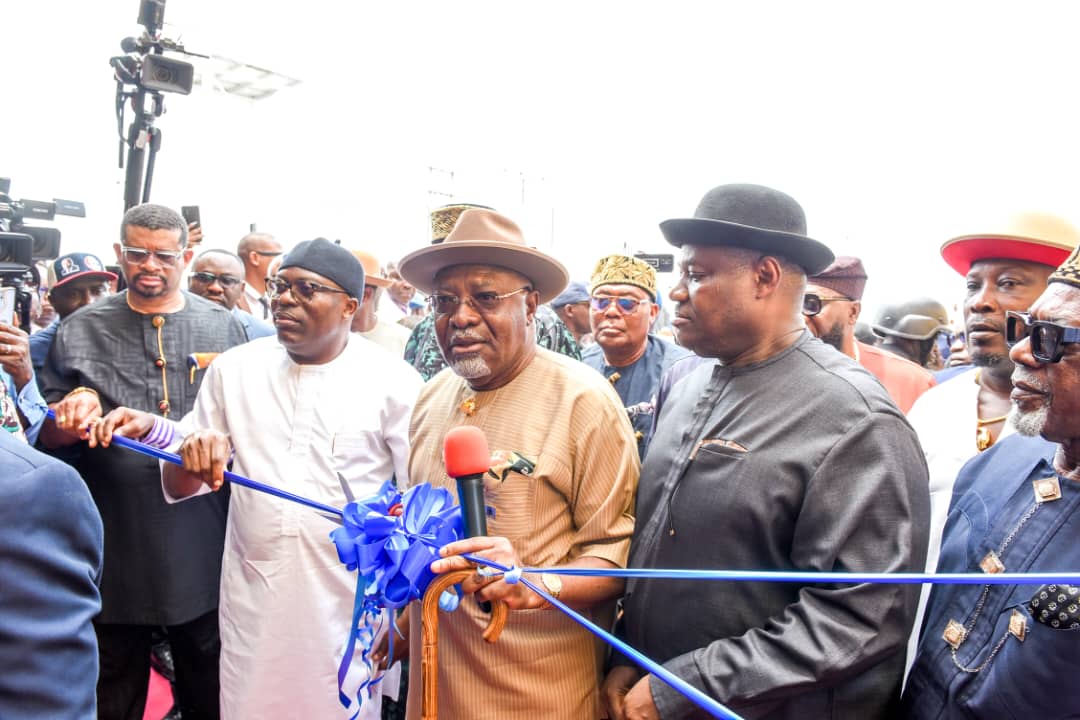
Rivers State Governor, Sir Siminalayi Fubara, has said that the Borokiri Fire Service Sub-Station in the Old Port Harcourt Township will serve as a local-level fire disaster management resource centre to provide quick response to emergencies and ensure protection of lives, property, and the environment from fire disasters.
Governor Fubara gave the assurance while inaugurating the Rivers State Fire Service, Borokiri Sub-Station in the Old Port Harcourt Township in Port Harcourt City Local Government Area, last Thursday.
The Governor stated that fire service stations are essential components of critical services that must be provided by any government for its people as proof of commitment to their safety.
Governor Fubara maintained that the inauguaration of the station, therefore, aligns with what government must do without fun-fare because discharging statutory responsibility to the citizenry is not anything to advertise.
He said: “The purpose of government is to provide services. The purpose of government is to protect lives and property. So, while we are doing those things that we are elected for, and we now start showcasing it, sometimes, it doesn’t make any sense. But, that is what the business has really turned into, which is, whatever you are doing now, you have to showcase so that they will know that you are really working.”
Governor Fubara also said: “Some persons will commission borehole, some will commission all sorts of things, and they do adverts for it. But for us, we have chosen to showcase to the world vital and most needed items of service as a government. What we are showcasing here today is one of the essentials of governance. Fire service station is a very important component in every system.”
Governor Fubara explained that some days ago, he unveiled the modernised and remodelled Headquarters of the Rivers State Fire Service to signal the restorable of stable and regular response to fire disasters across the State.
He said, three days after, he has returned to show to the world a similar word of revitalisation that has been achieved on the Borokiri Sub-Station that will end years of absence of such services available to the residents in that part of the township.
Governor Fubara stated: “Borokiri is a section of the Town, one of the densely populated areas of Port Harcourt City. The essence of rehabilitating this Fire Service Station is to cater to the huge population that is living here.
“We had cases of fire outbreak, from time to time, and we have never adequately responded to them. I strongly believe that after this minute, whatever that would happen, provided it is within the power and jurisdiction of this station, it would be combated adequately.”
Governor Fubara expressed delight over what has been achieved and made available to the people, who are also grateful, and appreciated it with gratitude, exemplified with the joy and excitement on their faces, stressing that this is the reason why his administration will remain resolute, and continue to work to better the lives of all residents in the State.
Performing the inauguaration, former Minister of Transport, Dr Abiye Sekibo, said the project reflects purposeful leadership that has prioritised the wellbeing of the people because they will get assistance to tackling fire incidences when it occurs.
He pointed to the massive rehabilitation work that has been achieved on the long abandoned fire station, which now offers the assurance of more jobs created to engage willing youths to work, adding: “Your Excellency, I was Secretary to the Government in this State, this fire station existed then. I must confess that what I am seeing today is a state-of-the-art fire station. Thank you for your care and for your love.
“This is also an opportunity to expand the possibility of work for our people. When there are instruments to work with, you need people to use them and drive these vehicles to fight the fires. I am sure that our Governor will use this, as a point of reference, to ensure that we have employment within the system that gives our youths something to do.”
Dr Sekibo also said that Governor Fubara carries the collective hope and vision of all Rivers people who are resolute and determined to continue to support him, saying that this is the more reason why President Bola Tinubu should also support Governor Fubara who, as an ally, has continued to work for the success of his administration.
Dr Sekibo also said that, for the first time in 24 years, the Ijaw Nation, which is domiciled in more than 8 local governments of Rivers State, now have the opportunity of governing the State and enjoys massive support of the people.
So far, he noted, the leadership provided by Governor Fubara has been tested in the bold decisions that he has taken to steer the progress of Rivers people, emphasising: “The work our Governor has done in this State in the short time he has been Governor, shows that he prioritizes our interest, and indeed, cares for the unity of this nation.
“This Governor, at a time when our funds are seized, he made sure that there was no problem in this State. He made sure that essential services continued, he didn’t try to create problems for the Federal Government.”
He pointed to how Rivers people have always supported the government at the centre and have not ceased, adding that under the leadership of Governor Fubara, Rivers people are still and will continue to support the President Bola Tinubu-led Federal Government.
He explained: “Mr President, the dear President of Nigeria, our own President Bola Ahmed Tinubu, we, the Rivers people, have always supported the government at the centre. We have always worked with the government at the centre. This Governor, Sir Siminalayi Fubara, has convinced Rivers people that they must stand with their President, and so, we stand with you.
“There might be persons telling you stories, especially when they see people like me, who was a core Atiku man. They will say, don’t you see, it is Atiku people that are with the Governor. There are also Atiku people that are with them there in Abuja. But, the Governor has convinced us that the place to be is to be with our President. So, Mr President, we stand with you. We stand with you because that is the right thing to do. The election delivered you as our President, and so, we stand with you. The election also delivered our Governor, our son, and we stand with him.”
Dr Sekibo advised Rivers people, who felt demoralised by the Supreme Court judgment, to brace up and give unalloyed support to Governor Fubara, who has assured of obeying the ruling to the latter.
In his speech, Rivers State Commissioner for Special Duties, Dr Samuel Anya, said the Rivers State Fire Service, Borokiri Sub-Station was abandoned for years, but quickly added that Governor Fubara has rehabilitated the structures, provided necessary materials, equipment and fire trucks to serve the people better, and guarantee their safety.
Featured
We’ve Strengthened Rivers Fire Fighting Capability – Fubara
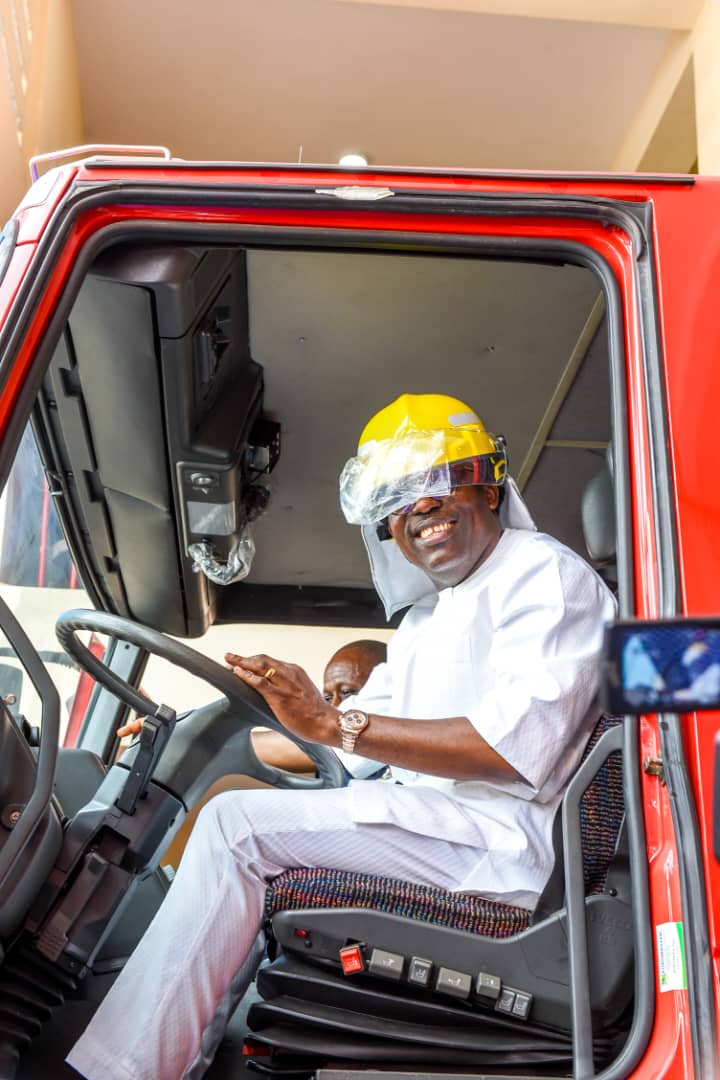
Rivers State Governor, Sir Siminalayi Fubara, has said that the modernised fire-fighting units with new buildings, necessary machinery, materials and equipment will strengthen the emergency response capability of personnel to fire incidences in the State.
The Governor pointed to how the provision will drastically reduce, if not eliminate, the vulnerability of Rivers population to fire disasters, as according to him, there will be timely assistance to victims to reduce damage and bolster conditions for sustainable development.
Governor Fubara, who gave the assurance while inaugurating the Rivers State Fire Service Headquarters Station, located by Isaac Boro Park Flyover, in Port Harcourt City Local Government Area, yesterday, said the gesture serves as a consolidation of the promise made, in line with his vision of governance: to provide quality service to the good people of Rivers State.
He explained that some years ago, the State was at the mercy of the multi-nationals that had functional fire trucks to respond to most fire incidences, and pointed to setbacks that greeted some emergencies, adding that the records of losses to fire incidences were colossal.
Governor Fubara said: “We lost the Mile One Market because we couldn’t respond adequately. We lost, even what we call, the Fruit Garden Market because we could not respond. Are we talking about houses, lives that have been lost in this State because of inadequate fire service?”
The Governor insisted that the purpose of governance is to provide such quality social services, protect lives and property, and make living comfortable for the people, asserting that his administration has not failed in those regards, and has continued to intensify the provision of services that have made Rivers people happy.
He said, “And, what we are doing today is to tell the good people of Rivers State, and to showcase to the world, that there is governance in this State. Not governance for the sake of governance, but governance that is purpose-driven, governance that is interested in projects that will change the lives of our people.
“Some days ago, a tanker fell along the Woji-Elelenwo Road. If it were before, lives would have been lost. But immediately, the fire service, not the multi-nationals, it was the Rivers State Fire Service that responded and arrested the situation. What else are we talking about?”
Governor Fubara said Rivers people are very happy with the consistent delivery of infrastructure projects that address the critical problems experienced by the people in the larger society, emphasising that he believed strongly that even if some persons are indulged in clandestine activities, and determined to discredit his administration, Rivers people are happy, indisputably so.
He explained, “We are not interested whether those people who are commissioned to undermine us are unhappy, that is not our business. Our business is about Rivers State and Rivers people. So, like the Commissioner said, we did not just do this for the sake of glamour. You come here, you see a painted house, every facility that is required in a well-built fire fighting facility, is all in this place.”
Governor Fubara said further: “You can image a government that has a fire service and the firemen are not working. It is only at the end of the month you pay them their salaries. You can see that they were not happy and unproductive. But today, they are happy because they have a big responsibility now ahead of them: to ensure that lives and property of the good people of Rivers State are adequately protected. So, I want to thank you for this particular spirit at this moment.”
Governor Fubara commended the Commissioner for Special Duties, Dr Sam Anya, for driving the process to conclusion, and the contractor for delivering the project on schedule, and assured that his administration will continue to ensure the protection of lives and property while defending the Constitution of the Federal Republic of Nigeria.
Governor Fubara also told Rivers people to expect the provision of more basic amenities, unbiasedly, and advised those in charge of the firefighting equipment to safeguard and protect them so that they can serve their purpose maximally.
Providing the project description, Rivers State Commissioner for Special Duties, Dr Samuel Anya, explained that since the first fire service station was built in the 1960s, this was the first time the facility is being remodeled and upgraded, emphasising that certain features were introduced and added to make the station comparable to fire service stations nationally.
He stated: “We have gym, sick-bay, offices and state-of-the-art equipment that we will use to combat fire. Your Excellency, we have also, new fire trucks that you have acquired. Before now, we did not have any truck, and when incidents happen, we have to call the Federal Fire Service or call Agip or Shell Fire Service. But thank God that His Excellency, in his wisdom, has given us state-of-the-art facility, and we don’t need to call any other person again.”
In his address, Head of Local Government Administration, Port Harcourt City Local Government Area, Mr. Clifford Paul, said Governor Fubara has turned the once dilapidated fire service station and its equipment into a modern masterpiece, which represents a significant milestone in the collective commitment towards tackling fire incidences.
Mr Paul stated that it will certainly enhance the capacity of personnel and reinforce their preparedness to respond to emergencies in the event of fire outbreaks.
-

 Editorial17 hours ago
Editorial17 hours agoThat NiMet’s Forecast
-
Politics20 hours ago
Tinubu Not Worried About 2027 Election – Presidency
-
Sports16 hours ago
Bayern Fail To Win, Again In Bundesliga
-
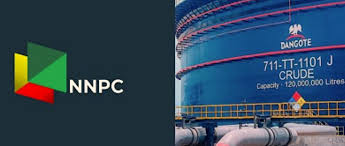
 Oil & Energy20 hours ago
Oil & Energy20 hours agoIPMAN Laments Losses From Dangote, NNPCL Fuel Price Feud
-

 News15 hours ago
News15 hours agoTinubu Congratulates Osakwe On UK Cybersecurity Award
-

 News17 hours ago
News17 hours agoPOA’ll Help Provide Citizens With Reliable Means-FG
-
Politics20 hours ago
PANDEF Youth Wing Gives Wike 48-Hr Ultimatum Demands His Withdrawal As Minister
-
Sports16 hours ago
Serie A: Napoli Miss Chance To Go Top

